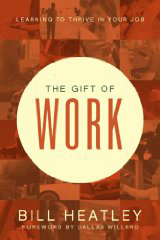The Gift of Work -> Chapter 6: Training as a Disciple of Christ
 Prepare and tend the soil.
Prepare and tend the soil.
The metaphor cuts across my tendency to complicate and over think my views on work and faith.
 My best bet for contributing to a healthy and bountiful crop is to prepare and tend the soil. My best bet for contributing to a meaningful and productive workplace is to become a certain sort of person. Instead of attempting to control the production process (which by definition in this metaphor is out of my control), I should focus on becoming the sort of character who can participate well whatever the process. Becoming a certain kind of person is in my control.
My best bet for contributing to a healthy and bountiful crop is to prepare and tend the soil. My best bet for contributing to a meaningful and productive workplace is to become a certain sort of person. Instead of attempting to control the production process (which by definition in this metaphor is out of my control), I should focus on becoming the sort of character who can participate well whatever the process. Becoming a certain kind of person is in my control.
What sort of person? A learning person. An engaged person. An attentive person. A healthy person. A grounded person. A God-connected person. A maturing person.
Instead of asking what sort of decisions does God want me to make, I’d be better off asking what sort of decision-maker does God want me to become. Foster a healthy maturing process and the capacities, insights and perspectives of maturity will be available to inform and resource everything I do.
Now I (Karl) am more open to hearing about these “spiritual disciplines” that Heatley asserts are so important. Instead of esoteric, ethereal and obsolete religious rites, they become accessible, practical and relevant life tools. Sold on the value of tending the soil… becoming a certain kind of person, I am motivated to invest in my character, my soul, my relationship with God.
Instead of my faith being separate and unrelated to my professional efforts, it becomes core and foundational. Not because I start doing explicitly religious things at work like organizing Bible studies or inviting people to church or lobbying for less profanity at the water cooler; but because I need to possess the depth, soundness, strength and poise to address the explicitly work-based issues that are influencing my community and this planet for good or for ill.
What do you think? What was your main take-away from this chapter? Join the conversation!







April 21st, 2009 at 9:30 am
This was another strong chapter, the best in the book so far. (And that cumulative build in the book’s focus and impact is just what you want to see.) First, for a big-picture view, Heatley’s case grows and grows: we’re starting to “see” what it is to be Christ-centered in the workplace. That’s good, very good, because it’s all too easy to segregate God out of our workaday world. If, to switch metaphors just a little here, we leave God effectively out of the public square, then God will quickly die out in the private sphere, too. The point is not, as Karl says in his reflections on chap. 6, to do explicitly “religious” activities at work (or in the “public square”), but to have a character shaped by our daily encounter with God. It’s at just this point that Bill Heatley is so helpful: he points out that the divine encounter (as I’m calling it) is not just a passive matter of receiving the good seed, but includes the spiritual disciplines to make the soil ready. Hence, we want to read the parable of the sower “like a farmer,” rather than like a passive consumer.
But how do we “hear” God’s Word? This brings us to concrete applications of the theme: how we hear God is determined by Scripture, Holy Spirit, and context. We have to exercise discernment to find the places of consonance between these three streams, the so-called Three Lights.
Heatley’s personal sense of call to communicate God’s Word gives us a good example of such discernment in action. He tells us the instruction from God was clear; the details had to be worked out over time. But the consonance of his sense of call (Holy Spirit) with Scripture and his life circumstances all came together to show him that he should write about bringing God into the work setting.
Each of our settings will be unique. Each of our “jobs” will involve different burdens and pleasures. Heatley offers real encouragement to find ways to let Christ be present right in the midst of wherever it is we find ourselves.
His discipline for the chapter is silence, and he has a very practical modification of it: “Before you speak, take a breath and seek God,” (p. 119). Simple. Workable. Practical. Might just transform a good part of our lives “on the job.”